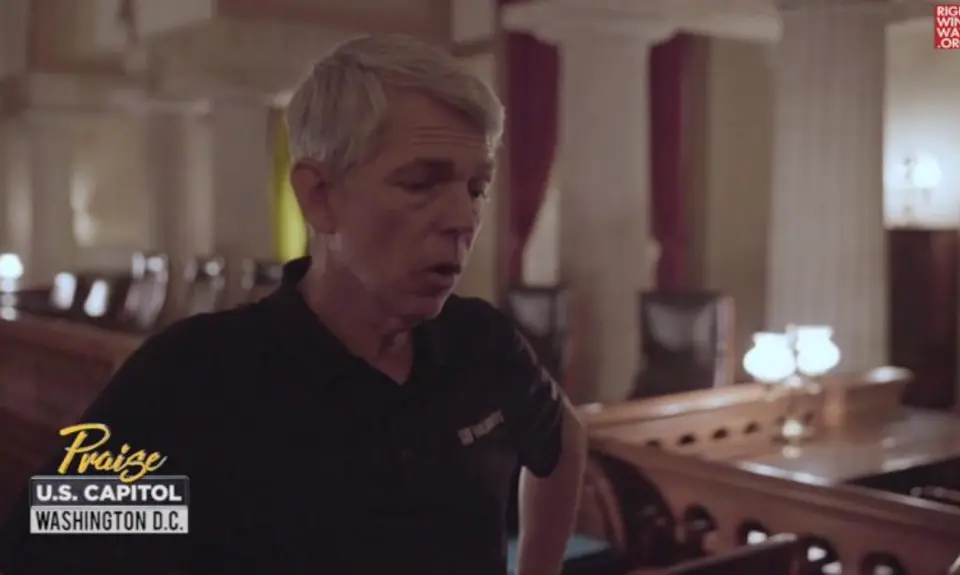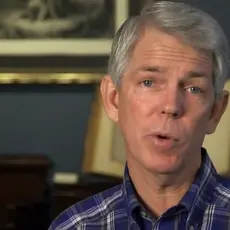Earlier this week, the Trinity Broadcasting Network aired a special featuring footage of the "Spiritual Heritage Tours" of the U.S. Capitol that are regularly led by right-wing psuedo-historian David Barton throughout the year.
Predictably, the tour featured the same false history that Barton spreads via his daily radio program and through the presentations he delivers all over the country, including his blatant misrepresentation of the ruling in the 1844 Supreme Court case called Vidal v. Girard’s Executors.
While leading a tour through the Old Supreme Court Chamber, Barton made the following assertion about the case:
This is set up as the Old Supreme Court. Daniel Webster, as I mentioned, just doesn't lose cases here at all. One of the cases he argued out here lasted three days and it was a case where that the richest man in America left his wealth to the city of Philadelphia on the condition that they set up a school for young boys—orphans and poor—he said,"Everybody needs a good education, I'm going to be willing to pay for that."
So the city of Philadelphia has to administer the school, run the school, set it up, operate it, et cetera, and the requirement he had was, but no ministers allowed on that campus at all because he was an atheist, he hated religion, didn't want it to be part of it. The city of Philadelphia is going to be running and operating this school, but no ministers allowed.
Well, Daniel Webster stands there on the third day of arguments, he opens up and he points at the justices and he said, "Do you justices think you're wiser than the Son of God, the savior of mankind?" Now that's a loaded question. Who's going to answer that? He said, "Well, He's told us 'suffer the little children to come unto me.' We have a school in Philadelphia saying, 'No, no, no, we're not letting ministers on campus.' That's an effort to keep the Bible off campus, that's an effort to keep the Gospel off campus. Are you going to let a school exist in America that doesn't have the Bible, that doesn't have the Gospel?"
...
So the Court goes out and deliberates and they come back they said, "Well, the guy can leave his wealth to whoever he wants to, that's fine if he wants to leave it to the city. But here's the deal, if you're going to be a school in America, you will teach the Bible in America, we will not have a school run by the government that does not teach the Bible." 8-0 unanimous Supreme Court decision right here where that if you're going to have a public school run by the government, it's gonna teach the Bible.
The takeaway from Barton's version of events is that, thanks to Daniel Webster's brilliant argument, the Supreme Court struck down the effort to create this school that refused to teach the Bible... but that is exactly the opposite of what happened.
What the Supreme Court actually said was that there was nothing in Girard's will that prohibited the teaching of the Bible or Christianity, as long as such things were taught by lay people and not ministers. Webster's argument failed and the Court upheld Girard's will:
Here, then, we have the reason given, and the question is not whether it is satisfactory to us or not, nor whether the history of religion does or does not justify such a sweeping statement, but the question is whether the exclusion be not such as the testator had a right, consistently with the laws of Pennsylvania, to maintain, upon his own notions of religious instruction. Suppose the testator had excluded all religious instructors but Catholics, or Quakers, or Swedenborgians, or, to put a stronger case, he had excluded all religious instructors but Jews, would the bequest have been void on that account? Suppose he had excluded all lawyers, or all physicians, or all merchants from being instructors or visitors, would the prohibition have been fatal to the bequest? The truth is that in cases of this sort, it is extremely difficult to draw any just and satisfactory line of distinction in a free country as to the qualifications or disqualifications which may be insisted upon by the donor of a charity as to those who shall administer or partake of his bounty.
But the objection itself assumes the proposition that Christianity is not to be taught, because ecclesiastics are not to be instructors or officers. But this is by no means a necessary or legitimate inference from the premises. Why may not laymen instruct in the general principles of Christianity as well as ecclesiastics. There is no restriction as to the religious opinions of the instructors and officers. They may be, and doubtless, under the auspices of the city government there will always be men not only distinguished for learning and talent, but for piety and elevated virtue, and holy lives and characters. And we cannot overlook the blessings, which such men by their conduct, as well as their instructions, may -- nay must -- impart to their youthful pupils. Why may not the Bible, and especially the New Testament, without note or comment, be read and taught as a divine revelation in the college -- its general precepts expounded, its evidences explained, and its glorious principles of morality inculcated? What is there to prevent a work, not sectarian, upon the general evidences of Christianity, from being read and taught in the college by lay teachers? Certainly there is nothing in the will that proscribes such studies. Above all, the testator positively enjoins,
"that all the instructors and teachers in the college shall take pains to instill into the minds of the scholars the purest principles of morality, so that on their entrance into active life, they may from inclination and habit evince benevolence towards their fellow creatures, and a love of truth, sobriety, and industry, adopting at the same time such religious tenets as their matured reason may enable them to prefer."
Now it may well be asked what is there in all this which is positively enjoined, inconsistent with the spirit or truths of Christianity? Are not these truths all taught by Christianity, although it teaches much more? Where can the purest principles of morality be learned so clearly or so perfectly as from the New Testament? Where are benevolence, the love of truth, sobriety, and industry, so powerfully and irresistibly inculcated as in the sacred volume? The testator has not said how these great principles are to be taught or by whom, except it be by laymen, nor what books are to be used to explain or enforce them. All that we can gather from his language is that he desired to exclude sectarians and sectarianism from the college, leaving the instructors and officers free to teach the purest morality, the love of truth, sobriety, and industry, by all appropriate means, and of course including the best, the surest, and the most impressive. The objection, then, in this view, goes to this -- either that the testator has totally omitted to provide for religious instruction in his scheme of education (which, from what has been already said, is an inadmissible interpretation), or that it includes but partial and imperfect instruction in those truths. In either view can it be truly said that it contravenes the known law of Pennsylvania upon the subject of charities, or is not allowable under the article of the bill of rights already cited? Is an omission to provide for instruction in Christianity in any scheme of school or college education a fatal defect, which avoids it according to the law of Pennsylvania? If the instruction provided for is incomplete and imperfect, is it equally fatal? These questions are propounded because we are not aware that anything exists in the Constitution or laws of Pennsylvania or the judicial decisions of its tribunals which would justify us in pronouncing that such defects would be so fatal. Let us take the case of a charitable donation to teach poor orphans reading, writing, arithmetic, geography, and navigation, and excluding all other studies and instruction; would the donation be void, as a charity in Pennsylvania, as being deemed derogatory to Christianity? Hitherto it has been supposed that a charity for the instruction of the poor might be good and valid in England even if it did not go beyond the establishment of a grammar school. And in America, it has been thought, in the absence of any express legal prohibitions, that the donor might select the studies, as well as the classes of persons, who were to receive his bounty without being compellable to make religious instruction a necessary part of those studies. It has hitherto been thought sufficient, if he does not require anything to be taught inconsistent with Christianity.
Looking to the objection therefore in a mere juridical view, which is the only one in which we are at liberty to consider it, we are satisfied that there is nothing in the devise establishing the college, or in the regulations and restrictions contained therein, which are inconsistent with the Christian religion or are opposed to any known policy of the State of Pennsylvania.
This view of the whole matter renders it unnecessary for us to examine the other and remaining question, to whom, if the devise were void, the property would belong, whether it would fall into the residue of the estate devised to the city, or become a resulting trust for the heirs at law.
Upon the whole, it is the unanimous opinion of the Court that the decree of the Circuit Court of Pennsylvania dismissing the bill, ought to be affirmed, and it is accordingly.
In 2005, Jay Sekulow, head of the Religious Right organization The American Center for Law and Justice and an attorney for President Trump, co-wrote an academic paper about the case that appeared in the Pepperdine Law Review which noted that "[Chief Justice Joseph] Story delivered a unanimous opinion for the Court, upholding the provisions prohibiting ministers and missionaries from teaching at the school."
Girard College still exists today.
Barton's absurd misrepresentation of the ruling in this case leaves his audience with an entirely false understanding of what actually happened, which is not surprising since this particular tactic has been a key component of his decades-long effort to use false history to bolster his right-wing political agenda.






